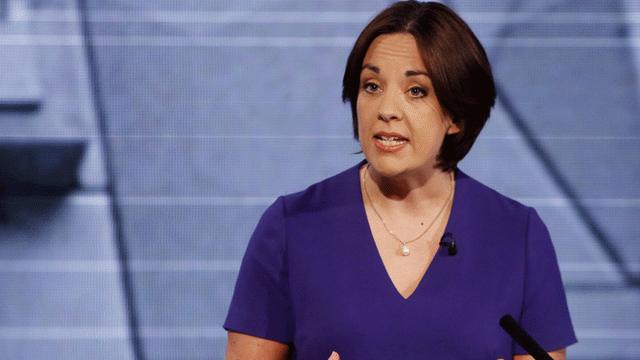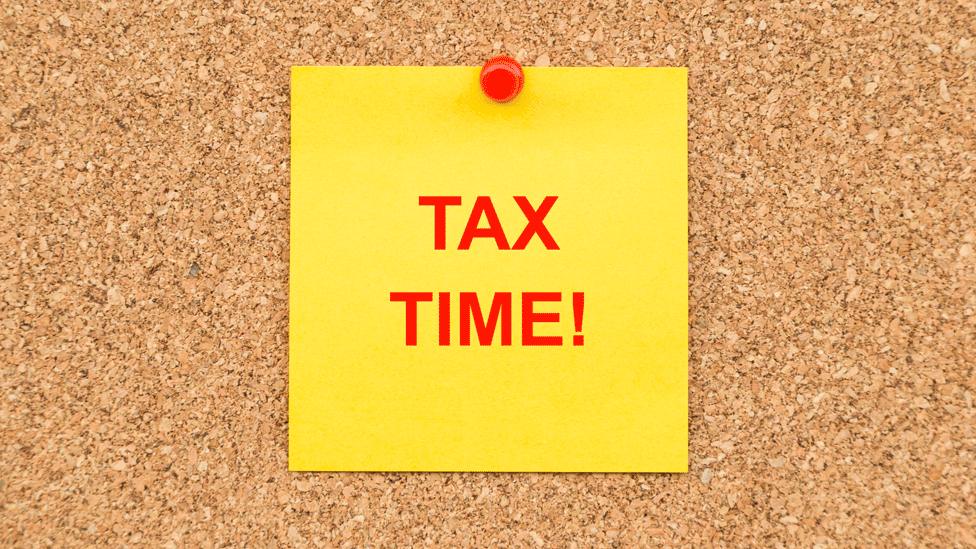Kezia Dugdale: 50p income tax rate 'not gesture politics'
- Published
Kezia Dugdale: "The sums are there. Our tax proposals would generate around £600m a year"
The leader of Scottish Labour has insisted that raising the top rate of income tax to 50p is not merely gesture politics - and could raise up to £110m.
Kezia Dugdale said her party would use the money to close the attainment gap in Scotland's schools.
SNP leader Nicola Sturgeon has argued raising the top rate could cost Scotland £30m.
And the Conservatives have warned against making Scotland the highest-taxed part of the UK.
The Liberal Democrats - like Labour - have argued for an immediate 1p income tax increase across all bands, which they have estimated would raise £475m to help "transform" Scottish education.
The Scottish Parliament will have the ability to set income tax rates and bands from 1 April next year - with the issue a clear dividing line between the parties ahead of the Holyrood election on 5 May.
But the SNP, which opinion polls have suggested is on track for a third successive Holyrood victory, has ruled out raising the basic 20p rate for the five years of the next parliament, with Ms Sturgeon also pledging the top rate will not rise in 2017-18.
Ms Sturgeon told the BBC's Good Morning Scotland programme on Tuesday that raising the top rate for those earning more than £150,000 from 45p to 50p - higher than elsewhere in the UK - could see Scotland lose up to £30m a year.
She pointed to concerns that the top 1% of earners - who pay more than a fifth of the income tax total - would be able to move their homes to England, or find other ways of avoiding paying the higher Scottish rate.
However, Ms Sturgeon said she would ask her economic advisers to examine the potential impact of a 50p top rate on a year-by-year basis.

Making it clear: Why does the SNP say a 50p tax rate would be a revenue loser?

HM Revenue and Customs reckon that:
for every £100 declared by 45% additional tax earners a, 5 point increase would reduce their declared income by £48. The Institute of Fiscal Studies thought it might be £46.
The Scottish government looked at a variety of possible responses by additional tax earners:
the lowest behavioural response is a reduction by £35 per £100 currently in the top banding.
the highest response would see a £75 reduction, and if the accountants have got it right that would add up to £30m a year revenue loss.

Ms Dugdale told Holyrood magazine in October, external that a 50p tax rate "could also raise zero because of the mechanisms by which people can avoid paying tax".
But speaking to Good Morning Scotland on Wednesday, she insisted: "Since that point Her Majesty's Revenue and Customs (HMRC) have had a crackdown on people being able to move their tax liability throughout the United Kingdom."
'Fundamentally disagree'
She was referring to evidence given by HMRC to Holyrood's finance committee in October, in which the agency said it was preparing to clamp down on high earners who attempt to avoid paying the new Scottish rate of income tax, external by changing the location of their main home to England.
Ms Dugdale said her party had estimated that increasing the tax rate for those earning more than £150,000 would bring in "between £70m and £110m".
She added: "Its not gestural politics and the Scottish government's own analysis that Nicola Sturgeon published last week actually details that it would raise money,
"Her problem is not with the detail of this - its the principle. She quite clearly, like Ruth Davidson, doesn't think that the richest should pay any more tax in Scotland. I fundamentally disagree.
"I think Nicola Sturgeon is making the same excuses the Tories made, they're trying to say rich people will be able to avoid tax while the rest of us have to pay.
"I think if you believe in the principle of the richest paying their fair share, you chase after the money, you make sure they pay their taxes."
Ms Dugdale said the additional revenue would be used to pay for the party's "fair start fund" - which would see schools receive an additional £1,000 for each pupil who is entitled to free school meals.
Headteachers would then be able to use the money to help close the attainment gap between the wealthiest and most deprived pupils, Ms Dugdale said. She has estimated the policy would cost about £77m.
- Published30 March 2016

- Published30 March 2016
